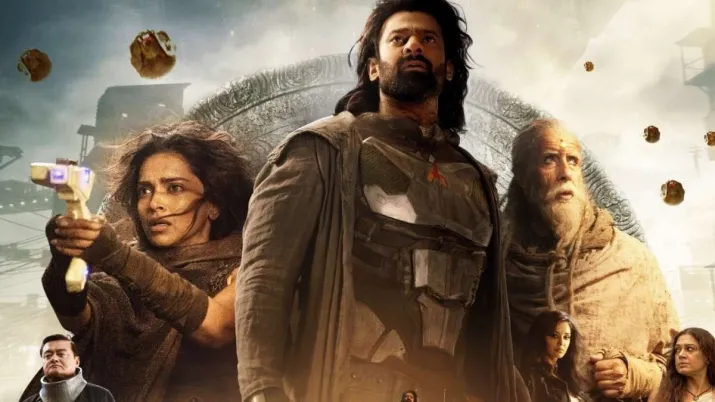
Punchline: When mythology meets the far future, Kalki 2898 AD transforms cinema into prophecy—an epic where ancient faith battles dystopian fate.
A Visionary Leap Into the Future
Released on June 27, 2024, Kalki 2898 AD is one of India’s most ambitious cinematic experiments, directed by Nag Ashwin and produced by Vyjayanthi Movies. Blending mythology with science fiction, the film creates a dystopian narrative set nearly a thousand years into the future. With a star-studded ensemble featuring Prabhas, Amitabh Bachchan, Kamal Haasan, Deepika Padukone, and Disha Patani, the movie stands as a landmark in pan-Indian cinema, setting new standards for storytelling, technology, and global appeal. It represents a bold leap for Indian filmmaking into uncharted territories of futuristic imagination and mythological reinterpretation.
The Myth Reimagined
At its core, the story revolves around the prophecy of Kalki, the final avatar of Lord Vishnu, who is destined to appear in an age of chaos to restore dharma. Set in 2898 AD, humanity is oppressed by a tyrannical regime led by Yaskin (Kamal Haasan), who rules from the colossal Complex, a towering symbol of totalitarian power. The world is bleak, stripped of resources, and ruled by elites who exploit the masses. In this despair, SUM-80, portrayed by Deepika Padukone, becomes central to the narrative as she carries the unborn child believed to be the reincarnation of Kalki. Protecting her becomes the mission of rebels led by Ashwatthama (Amitabh Bachchan), creating a riveting clash of destiny, faith, and resistance. The intertwining of epic mythology with futuristic dystopia makes Kalki 2898 AD not just a film, but a philosophical reflection on cycles of destruction and rebirth.
The World-Building Marvel
What sets Kalki 2898 AD apart is its breathtaking scale and detailed world-building. From colossal fortresses and technologically advanced war machines to sprawling dystopian cityscapes and flying vehicles, every frame is designed to immerse the viewer in a future that feels both alien and rooted in familiar mythological symbolism. Nag Ashwin collaborated with global VFX studios to bring this vision alive, ensuring the film could compete visually with the biggest Hollywood blockbusters. Santhosh Narayanan’s score adds another dimension, seamlessly blending futuristic electronic beats with traditional Indian instruments, reinforcing the duality of past and future.
Box Office and Critical Reception
Upon its release, the film shattered records, becoming one of the highest-grossing Indian movies in history. It earned praise for its ambition, scale, and genre-defying storytelling. Critics highlighted the stellar performances, especially Amitabh Bachchan’s powerful portrayal of Ashwatthama and Kamal Haasan’s menacing Yaskin, while Prabhas anchored the film with a mix of vulnerability and heroism. Deepika Padukone’s role as SUM-80, though central, was both celebrated and debated for its symbolic depth. While some critics pointed out pacing issues and a complex narrative structure that might overwhelm casual viewers, the consensus remained that the film marked a watershed moment for Indian cinema. It became a global talking point, with audiences across continents recognizing India’s growing capacity to deliver cinema of global standards.
Sequel and Future Prospects
The universe of Kalki 2898 AD is far from complete. A sequel has already been confirmed, extending the Kalki saga further into questions of destiny, rebellion, and cosmic justice. However, fans were surprised when news broke that Deepika Padukone will not return due to scheduling conflicts, raising curiosity about how her character’s arc will be handled. Prabhas, Amitabh Bachchan, and Kamal Haasan are expected to continue leading the narrative. The sequel is rumored to expand the scope even further, introducing new characters, higher stakes, and a deeper dive into the mythology of Kalki and the apocalyptic world of the 29th century.
Why Kalki 2898 AD Matters
Kalki 2898 AD is more than just a film—it’s a milestone in the evolution of Indian cinema. By daring to merge ancient epics with futuristic science fiction, it challenges the boundaries of genre and pushes Indian filmmaking into global consciousness. It also resonates with audiences by posing timeless questions: Can humanity escape cycles of oppression? Can faith and science coexist in shaping the future? And what role does myth play in guiding societies through crises? In doing so, the film positions itself not only as entertainment but as cultural commentary.
With its audacious mix of mythology, dystopia, spectacle, and futuristic imagination, Kalki 2898 AD isn’t merely a film—it is a cinematic revolution, a daring vision where past and future converge, urging Indian cinema to dream bigger and aim higher.
FOR MORE BLOGS – beyondthepunchlines.com

 Add to favorites
Add to favorites








